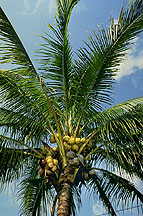This page has been archived and is being provided for reference purposes only. The page is no longer being updated, and therefore, links on the page may be invalid.
Mayaguez Lab Helps Farmers, Consumers AlikeBy Tara WeaverJune 12, 1998 Improved banana production, disease-resistant beans and hardier sorghum are some of the recent research achievements coming from the Tropical Agriculture Research Station of USDA's Agricultural Research Service in Mayaguez, Puerto Rico. I. Miley Gonzalez, USDA Under Secretary for Research, Education and Economics, will be visiting the station next week to meet with scientists to discuss their research. The ARS lab, established in 1902, helps farmers and consumers in the United States, Puerto Rico and the Caribbean basin. Scientists there develop and improve various tropical crops ranging from the ever-popular, potassium-enriched banana to the not-so- common taro root that’s becoming a popular potato chip in health food stores. Hawaiians cook the starchy, potato-like vegetable in their native poi dish. The Mayaguez laboratory recently embarked on a major project to develop tropical exotic fruits such as papaya, mangosteen, mamey, sapote, rambutan, sapodilla, longan and lychee for commercial production. This is a long-term research effort coordinated with ARS labs in Miami, Fla., and Hilo, Hawaii. Plantain, banana, avocado and mango research will still be priorities. Scientists at Mayaguez recently released six new edible dry bean germplasm lines-- including black, white, red, pinto and pink--that are resistant to common bacterial blight, a major disease of dry beans in humid U.S. regions. All six lines have good yield potential in both tropical and temperate climates. They also found that applying small amounts of water frequently with drip irrigation increases banana and plantain production and conserves water. Banana growers in mountain regions who supplement rainfall with drip irrigation can increase their yields by almost 60 percent--that’s about $6,000 per acre in gross sales and savings that could mean better prices for consumers. ARS’ Germplasm Introduction and Research Unit in St. Croix, Virgin Islands, is part of the Mayaguez station. New germplasm from other parts of the world is grown here first to ensure its viability, productivity and safety before being brought to the U.S. mainland. Scientific contact: Ricardo Goenaga, ARS Tropical Agriculture Research Station, P.O. Box 70, Mayaguez, PR 00681, phone (787) 831-3435, fax (787) 831-3386, RGOENAGA@ARS-GRIN.GOV.
|

